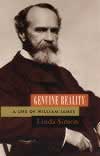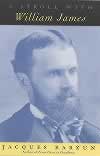William James (1842-1910) was one of the founders of modern Psychology.
He exercised a positive and pragmatic influence on the development of the young science. James had studied medicine and
became a teacher of physiology at Harvard where he soon became interested in Psychology. In 1876
he published an article in the very first edition of the journal Mind (Murphy, 1949: 192).
William James was the
brother of novelist Henry James, with whom he shared a powerful command of the English language. William James' Principles
of Psychology (1890) took him over a decade to write and amounted to 1500 pages in two volumes, much of it having previously appeared in Mind and other
journals. James was a considerable reader and had absorbed much of the writings of the Scottish, English, French and German schools of
Psychology but he produced his own interpretations of the subject. In his 'Principles', James defined Psychology as the 'science of mental life'. According to Roback (1961: 168):
"... it was immediately recognized as the greatest psychological textbook, at least
in English, that had thus far come off the press. Not that it was acclaimed universally. The
clergymen-psychologists certainly could not swallow James' tenets, wholly unencumbered by
theological implications. The Germans, again, baulked at the unsystematic presentation of topics, at
its rambling and sprawling utterances, which were just what added flavor to what, under other
circumstances, might have been a dry and dull treatise.
"Suffice it to say that the freshness of the point of view, the masterly
treatment of the main issues, the introduction of human-interest illustrations, the
authority manifest in the handling of scientific data - whether they belonged to chemistry,
physiology, or anatomy - and lastly, the inimitable style must have struck the initiates as well
as the instructors as something of an entirely different order from what they had been
accustomed to read."
Murphy (1949: 194) describes the 'Principles' as having 'burst upon the world like
a volcanic eruption.' James was not setting out to present his audience with a 'system' of Psychology - Murphy comments that
'just as Wundt was the systematic psychologist par excellence, so James might be called the
unsystematic psychologist par excellence." Rather he intended to give his readers something 'to feed on'.
His writings - in small doses, at least - continue to be a delight to read, full of
acute observations and worldly wisdom. William James was particularly important for emphasizing the concept of the stream of consciousness. For example, in 1899 he wrote:
"Now the immediate fact which psychology, the science of mind, has to study is also
the most general fact. It is the fact that in each of us, when awake (and often when asleep),
some kind of consciousness is always going on. There is a stream, a succession of states, or waves, or fields (or of whatever you please to call them), of knowledge, of feeling, of desire, of dliberation, etc., that constantly pass and repass, and that
constitute our inner life. The existence of this stream is the primal fact, the nature and origin of it form the essential
problem, of our science. So far as we class the states or field of consciousness, write down their
several natures, analyze their contents into elements, or trace their habits of succession, we are on the
descriptive or analytic level. So far as we ask where they come from or why they are just what they are, we
are on the explanatory level."
(...) "It must be frankly confessed that in no fundamental sense do we know where
our successive fields of consciousness come from, or why they have the precise inner constitution which they do have. They
certainly follow or accompany our brain states, and of course their special forms are determined by our past experiences and education. But, if we ask just how
the brain conditions them, we have not the remotest inkling of an answer to give (...)."
The relationship between mind and brain continues to be a major topic of research and true understanding is
only slowly becoming available to us. Perhaps James' greatest contribution in this respect was his
theory of emotions. A great deal of material had appeared on the subject of emotions in the last half of the 19th century but much of it was descriptive
and physiological. As Murphy (p. 198) observes: 'Little critical thinking had been done as to
what emotions were. James published an article on the subject in Mind in 1884, the
content of which appeared later in the 'Principles'.
The crux of the theory is that emotions do not have an existence independent of
the physiological changes with which they are associated. In other words, physical changes and expressions do not follow
emotions. According to Murphy, (p.199) James held that 'not only does the arousal of physical
responses precede the appearance of the emotions, but our feeling of bodily changes as they occur is the
emotion.'
The Danish physiologist Carl Lange came up with a similar view in 1885. As a
consequence, this perspective is commonly known as the James-Lange theory. Murphy (p. 200)
defines this as 'the assertion that emotions are simply the manifestations in consciousness
of a tide of sensory impressions from skeletal muscles, viscera, and other organs.'
Needless to say, this theory has been hotly disputed ever since.
References
Butler, G. and McManus, F. (2000) Psychology: A Very Short Introduction, new edition, Oxford University Press.
James, W. (1899) Talks to Teachers on Psychology: and to Students on Some of Life's Ideals, Longmans, Green and Co: London, Bombay and Calcutta.
Murphy, G. (1949) An Historical Introduction to Modern Psychology, 5th edition, Routledge & Keegan Paul: London.
Roback, A.A. (1961) A History of Psychology and Psychiatry, Philosophical Library: New York.
More


